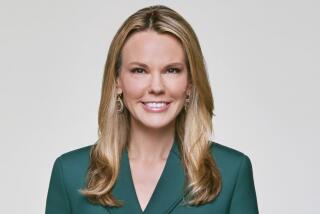Executives From 3 Networks Walk Out of Diversity Hearing
- Share via
An intense and passionate presentation by CBS President and CEO Leslie Moonves on Monday on the network’s commitment to multiculturalism highlighted the NAACP’s long-awaited hearing on the lack of television diversity. But the event took a bizarre turn when lower level executives from CBS’ three rivals abruptly walked out soon after his address.
Kweisi Mfume, president of the National Assn. for the Advancement of Colored People, criticized those delegations for walking out. “These are not drive-by hearings,” said Mfume. “These are serious hearings. It’s not an issue of ‘See us now or see us later.’ Sooner or later, you’re going to see us.”
ABC, NBC and Fox representatives became miffed when they were prevented from testifying during the same session as Moonves. However, NAACP hearing organizers noted that Fox Entertainment President Doug Herzog, NBC West Coast President Scott Sassa and ABC Television Network President Patricia Fili-Krushel declined the invitation to appear. As a result, they felt that Moonves deserved to be heard separate from the other networks and bumped those delegates--primarily from standards and practices divisions--from the late morning to an early afternoon session.
Moonves outlined the most wide-ranging and specific measures yet on improving diversity at CBS, ranging from deals with minority talent to business deals with vendors. The measures, some of which will take place immediately, include bonus incentives for senior management to diversify their divisions.
Noting that CBS is the top-ranked network not only with all viewers but with black viewers, Moonves also discussed the network’s upcoming “City of Angels” drama, which is set in an inner-city hospital and features a predominantly African American cast and a multiracial crew.
The ABC, NBC and Fox executives, some of whom said they had flown into town specifically for the hearing, and could not wait to speak in the afternoon, left behind written statements to be included in the record. But several NAACP officials and others in the packed meeting room at the Century Plaza Hotel in Century City called it a slap in the face to the NAACP and a public relations nightmare for the three broadcast networks, who have been criticized along with CBS for the nearly all-white landscape of the new shows on their fall prime time schedules.
The snub sets the stage for a conflict between those networks and the NAACP, which has issued a Dec. 20 deadline for the formation of specific goals and timetables for increased diversity in front of and behind the camera, in executive and writing ranks, and in business dealings. The organization has threatened to stage large-scale boycotts, marches and other consumer actions against at least one network next month if goals are not established.
Meanwhile, as the hearing was proceeding, Federal Communications Commission Chairman William E. Kennard issued a statement praising the NAACP for “prompting a national dialogue about the glass ceiling in television.” Kennard said the organization in two weeks would consider new Equal Employment Opportunity rules to widen the circle of opportunities in the broadcast industry.
“For too long, women and minorities have faced barriers to working in front of and behind the camera,” Kennard said in his statement. “Our nation benefits when television better reflects the diverse market it serves.”
The all-day hearing, which was attended by a vocal group of NAACP members, advocacy group members, industry insiders and celebrities such as Blair Underwood (“L.A. Law”) and Erika Alexander (“Living Single”) was the latest and most public salvo in the NAACP’s campaign against the television industry, which began in July when Mfume blasted the four networks for scheduling 26 new comedies and dramas that did not have one minority in a leading role.
Mfume oversaw the hearing with a multiethnic panel that included Esteban Torres of the National Latino Media Council; Sonny Skyhawk, founder and president of American Indians in Film & Television; Karen Narasaki, executive director of the National Asian Pacific American Legal Consortium; Dennis Hayes, NAACP general counsel and Debra Liu, assistant NAACP general counsel.
More to Read
The biggest entertainment stories
Get our big stories about Hollywood, film, television, music, arts, culture and more right in your inbox as soon as they publish.
You may occasionally receive promotional content from the Los Angeles Times.











